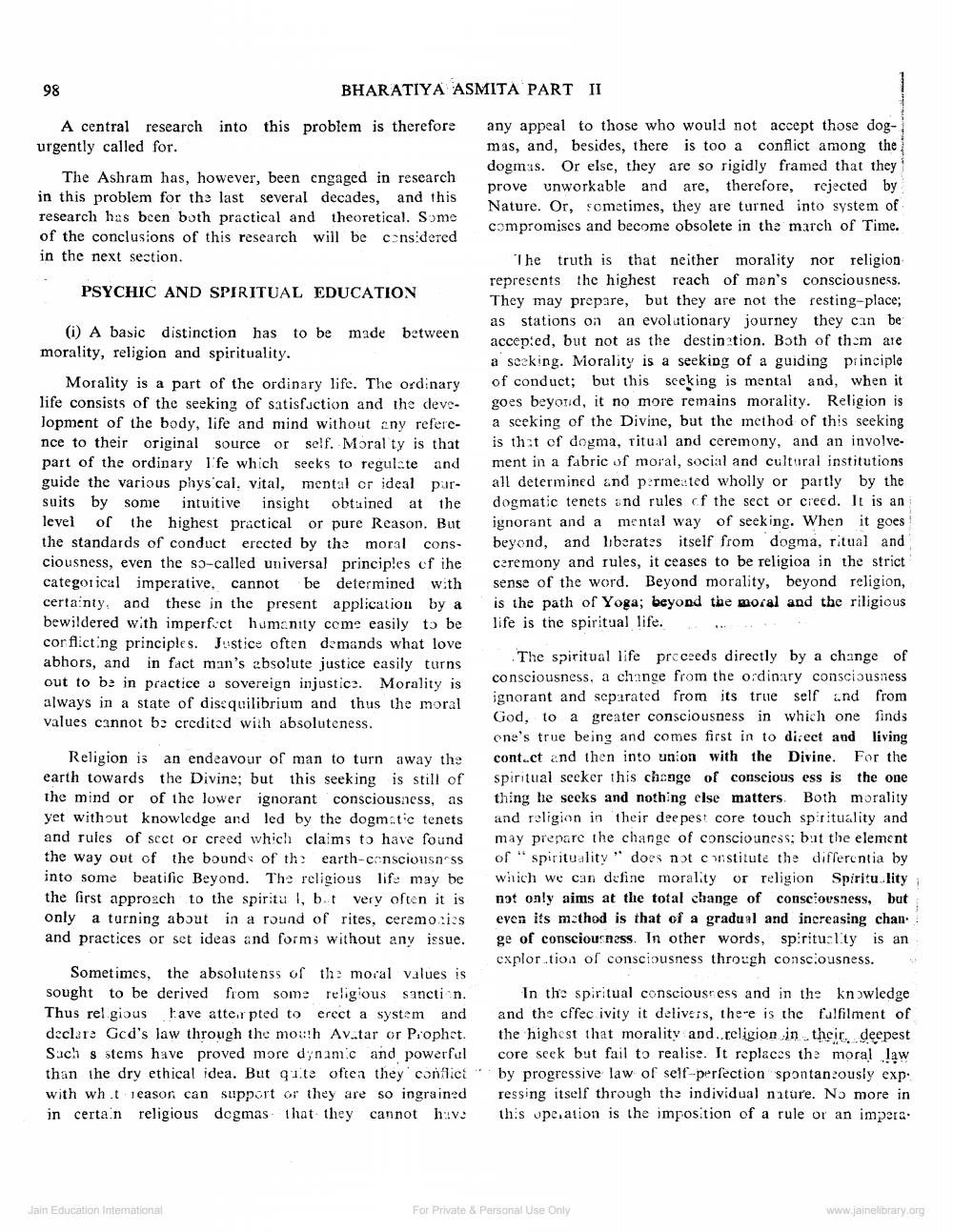________________
98
BHARATIYA ASMITA PART II
A central research into this problem is therefore urgently called for.
The Ashram has, however, been engaged in research in this problem for the last several decades, and this research has been both practical and theoretical. Some of the conclusions of this research will be considered in the next section.
any appeal to those who would not accept those dogmas, and, besides, there is too a conflict among the dogmas. Or else, they are so rigidly framed that they prove unworkable and are, therefore, rejected by Nature. Or, sometimes, they are turned into system of compromises and become obsolete in the march of Time.
PSYCHIC AND SPIRITUAL EDUCATION
(i) A basic distinction has to be made between morality, religion and spirituality.
Morality is a part of the ordinary life. The ordinary life consists of the seeking of satisfaction and the devolopment of the body, life and mind without any reference to their original source or self. Moral ty is that part of the ordinary l'fe which seeks to regulate and guide the various phys cal, vital, mental or ideal parsuits by some intuitive insight obtained at the level of the highest practical or pure Reason. But the standards of conduct erected by the moral cons ciousness, even the so-called universal principles of ihe categorical imperative, cannot be determined with certainty, and these in the present application by a bewildered with imperfect humanity come easily to be corflicting principles. Justice often demands what love abhors, and in fact man's absolute justice easily turns out to be in practice a sovereign injusticu. Morality is always in a state of disequilibrium and thus the moral values cannot be credited with absoluteness.
The truth is that neither morality nor religion represents the highest reach of man's consciousness. They may prepare, but they are not the resting-place; as stations on an evolutionary journey they can be accepied, but not as the destination. Both of them are a seeking. Morality is a seeking of a guiding principle of conduct; but this sceking is mental and, when it goes beyond, it no more remains morality. Religion is a seeking of the Divine, but the method of this seeking is that of dogma, ritual and ceremony, and an involvement in a fabric of moral, social and cultural institutions all determined and permeated wholly or partly by the dogmatic tenets and rules of the sect or creed. It is an ignorant and a mental way of seeking. When it goes beyond, and liberates itself from dogma, ritual and ceremony and rules, it ceases to be religioa in the strict sense of the word. Beyond morality, beyond religion, is the path of Yoga; beyond the moral and the riligious life is the spiritual life.
Religion is an endeavour of man to turn away the earth towards the Divine; but this seeking is still of the mind or of the lower ignorant consciousness, as yet without knowledge and led by the dogmatic tenets and rules of scct or creed which claims to have found the way out of the bounds of thearth-consciousn ss into some beatific Beyond. The religious life may be the first approach to the spiritu I, but very often it is only a turning about in a round of rites, ceremoniss and practices or set ideas and forms without any issue.
The spiritual life proceeds directly by a change of consciousness, a change from the ordinary consciousness ignorant and separated from its true self and from God, to a greater consciousness in which one finds one's true being and comes first in to direct and living cont..ct and then into union with the Divine. For the spiritual seeker this change of conscious ess is the one thing he seeks and nothing else matters. Both morality and religion in their deepest core touch spirituality and may prepare the change of consciouness; but the element of " spirituality" does not constitute the differentia by which we can define morality or religion Spiritulity not only aims at the total change of consciousness, but even its method is that of a gradual and increasing chan. ge of consciousness. In other words, spirituality is an explortion of consciousness through consciousness.
Sometimes, the absolutenss of the moral values is sought to be derived from some religious sanction. Thus rel gious have atter pted to erect a system and declare Gcd's law through the mouh Av.tar or Prophet. Sach s stems have proved more d;namic and powerful than the dry ethical idea. But qute often they condici with wht season can support or they are so ingrained in certain religious dogmas that they cannot hv.
In this spiritual consciousness and in the knowledge and the cffec ivity it delivers, there is the fulfilment of the highest that morality and religion in their deepest core seek but fail to realise. It replaces the moral law by progressive law of self-perfection spontaneously exp. ressing itself through the individual nature. No more in this upe.ation is the imposition of a rule or an impera.
Jain Education Intemational
For Private & Personal Use Only
www.jainelibrary.org




